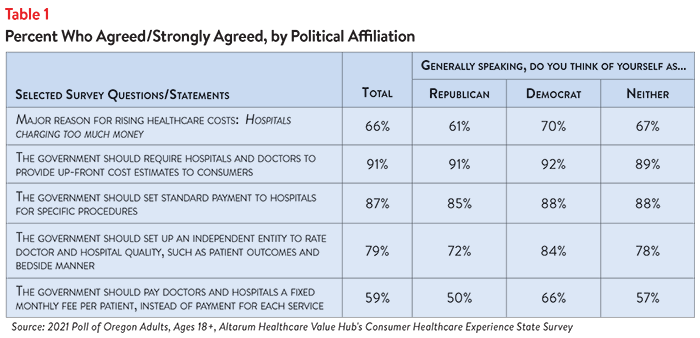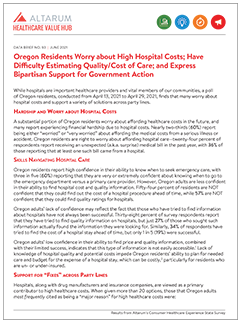Oregon Residents Worry about High Hospital Costs; Have Difficulty Estimating Quality/Cost of Care; and Express Bipartisan Support for Government Action
While hospitals are important healthcare providers and vital members of our communities, a poll of Oregon residents, conducted from April 13, 2021 to April 29, 2021, finds that many worry about hospital costs and support a variety of solutions across party lines.
Hardship and Worry about Hospital Costs
A substantial portion of Oregon residents worry about affording healthcare costs in the future, and many report experiencing financial hardship due to hospital costs. Nearly two-thirds (60%) report being either “worried” or “very worried” about affording the medical costs from a serious illness or accident. Oregon residents are right to worry about affording hospital care—twenty-four percent of respondents report receiving an unexpected (a.k.a. surprise) medical bill in the past year, with 36% of those reporting that at least one such bill came from a hospital.
Skills Navigating Hospital Care
Oregon residents report high confidence in their ability to know when to seek emergency care, with three in five (60%) reporting that they are very or extremely confident about knowing when to go to the emergency department versus a primary care provider. However, Oregon adults are less confident in their ability to find hospital cost and quality information. Fifty-four percent of residents are NOT confident that they could find out the cost of a hospital procedure ahead of time, while 57% are NOT confident that they could find quality ratings for hospitals.
Oregon adults’ lack of confidence may reflect the fact that those who have tried to find information about hospitals have not always been successful. Thirty-eight percent of survey respondents report that they have tried to find quality information on hospitals, but just 27% of those who sought such information actually found the information they were looking for. Similarly, 34% of respondents have tried to find the cost of a hospital stay ahead of time, but only 1 in 5 (19%) were successful.
Oregon adults’ low confidence in their ability to find price and quality information, combined with their limited success, indicates that this type of information is not easily accessible.1 Lack of knowledge of hospital quality and potential costs impede Oregon residents’ ability to plan for needed care and budget for the expense of a hospital stay, which can be costly,2 particularly for residents who are un- or under-insured.
Support for “Fixes” across Party Lines
Hospitals, along with drug manufacturers and insurance companies, are viewed as a primary contributor to high healthcare costs. When given more than 20 options, those that Oregon adults most frequently cited as being a “major reason” for high healthcare costs were:
- 74%–Drug companies charging too much money
- 68%–Insurance companies charging too much money
- 66%–Hospitals charging too much money
Oregon adults strongly endorse a number of hospital-related strategies, including:
- 91%–Require hospitals and doctors to provide up-front cost estimates to consumers3
- 87%–Set standard payment to hospitals for specific procedures
- 79%–Set up an independent entity to rate doctor and hospital quality, such as patient outcomes and bedside manner
- 59%–Pay doctors and hospitals a fixed monthly fee per patient, instead of payment for each servicefixed monthly fee per patient, instead of payment for each service
What’s even more remarkable is that support for these strategies is high across party lines (see Table 1).
Conclusion
The findings from this poll suggest that Oregon residents are motivated when it comes to searching for hospital cost and quality information to help inform purchasing decisions and plan for a future medical expense. However, cost and quality information is difficult for Oregon adults to find, despite recent action at the federal level to make hospital prices more transparent.4
It is not surprising that Oregon residents express strong support for government-led solutions to make price and quality information more readily accessible and to help patients navigate hospital care. Many of the solutions respondents support would take the burden of research and guesswork off of consumers’ shoulders, by standardizing payments for specific hospital procedures, requiring hospitals and doctors to provide consumers cost estimates for certain procedures or establishing an entity to conduct independent quality reviews, among other solutions. Policymakers should investigate the evidence on these and other policy options in order to respond to Oregon adults’ strong, bi-partisan call for government action.
Notes
1. As of January 1, 2021, the Centers for Medicare and Medicaid Services (CMS) requires hospitals to make public a machine-readable file containing a list of standard charges for all items and services provided by the hospital, as well as a consumer-friendly display of at least 300 shoppable services that a patient can schedule in advance. For more information, see: https://www.cms.gov/hospital-price-transparency/hospitals
2. According to Health Forum, an affiliate of the American Hospital Association, hospital adjusted expenses per inpatient day in Oregon were $3,724 in 2019—the second highest in the country, after California. See: Kaiser Family Foundation, State Health Facts Data: Hospital Adjusted Expenses per Inpatient Day. Accessed May 27, 2021.
3. See footnote 1.
4. This survey was conducted four months after the Centers for Medicare and Medicaid Services’ rule requiring hospitals to publicly display all standard charges for all items and services, as well as shoppable services, in a consumer-friendly format went into effect. While survey respondents may be reflecting on their experiences before the rule went into effect, the well-documented low compliance from large hospitals indicates that the rule has yet to demonstrate the desired effect. See: Kurani, Nisha, et al., Early Results from Federal Price Transparency Rule Show Difficulty in Estimating the Cost of Care, Kaiser Family Foundation (April 9, 2021). See also: Henderson, Morgan, and Morgane C. Mouslim, “Low Compliance from Big Hospitals on CMS’s Hospital Price Transparency Rule,” Health Affairs Blog (March 16, 2021). https://www.healthaffairs.org/do/10.1377/hblog20210311.899634/full/








